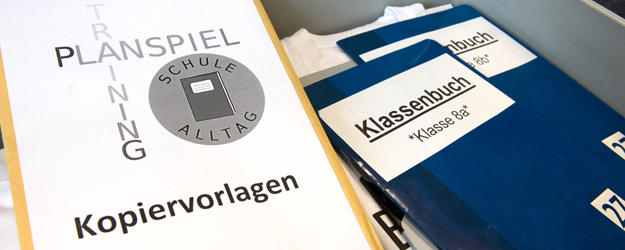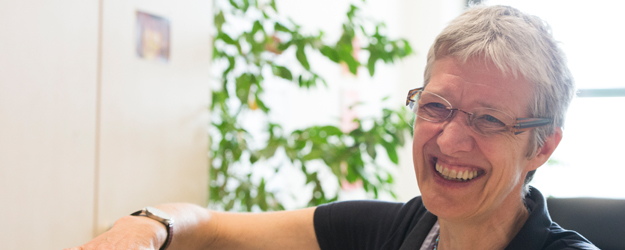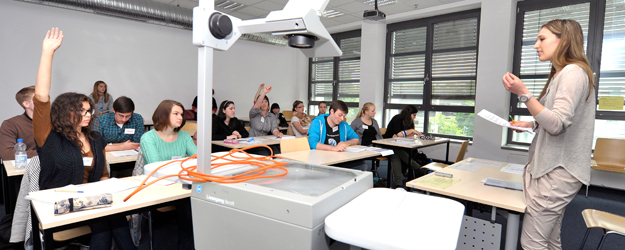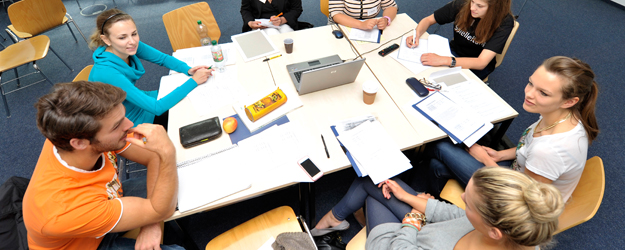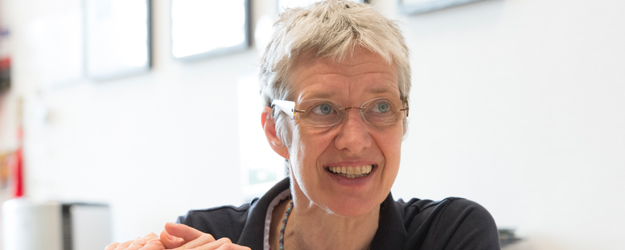19 July 2013
They mimicked a disgruntled teacher, a rebellious teenager, and a dedicated educator. Eighty student teachers participated in the School Day Simulation organized by the Institute of Psychology at Johannes Gutenberg University Mainz (JGU). Professor Margarete Imhof brought this unique project to Mainz, where it is planned to be held as a regular event in the future.
"It is really difficult to imagine it if you have not been through it yourself," says Professor Margarete Imhof, heaving a large, silvery metal case onto her desk. "I've got it all in here." Two locks click, the lid lifts ...
Eighty student teachers took the plunge and attended the Institute of Psychology at JGU to participate in its School Day Simulation. They assumed various roles, such as that of a manic art teacher or her colleague who only has his approaching retirement in mind. They played a twelve-year-old who is still sulking because she was not allowed to go to a party on Saturday night and a schoolboy who has just moved to the backwoods from Berlin and who is anything but impressed by his new surroundings, class, and schoolmates.
The case contains class books, teaching aids, T-shirts with the inscription 'Observer,' and a lot of other material. "At the start of the simulation, each student was given an envelope," explains Imhof. The case has forty of these envelopes altogether. They contain role-playing instructions: Six teaching posts and the post of the school principal need to be filled. And then there are also the 33 students in class 8a.
A schoolday in class 8a
Some aspects are already defined in detail and are carefully coordinated. So the envelope for the teacher of German called S. Müller contains, in addition to an outline of the teacher's character and a class schedule, 33 copies of the Goethe poem Welcome and Farewell. This is to be the topic of the lesson.
On the other hand, however, participants are given a lot of leeway when it comes to interpreting their roles. The character outlines merely represent, as it were, an initial starting point for the simulation. These include instructions such as "You are an obstreperous student who has been failed twice. You are not interested in paying attention in class."
Professor Ulrike Starker of the Department of Empirical Educational Research at the Otto Friedrich University of Bamberg devised this simulation game with the help of her team. Professor Margarete Imhof of the Department of Educational Psychology of JGU's Institute of Psychology invited her to Mainz to supervise and observe the simulation. The student teachers, divided into two groups of 40 participants, played out a normal school day for class 8a, including all the details relevant to a typical day at school.
"This has never been done before," says Imhof. "Of course, we already use role-playing games in our seminars, but not to this extent." She hopes for great things from this pilot project. "You sit there and you start to wonder why nobody has come up with this idea before. Role-playing is used everywhere else. Why not in a school-related context?"
Classroom dynamics
The simulation was made as true to life as possible. This meant that participants had to stay in their roles even during the breaks between lessons. The Institute of Psychology was prepared accordingly. There was even a sign outside the break room: "No mobile phones!" The newly-minted teachers were responsible for supervision.
"It was all about the dynamics in the classroom. This is something you can talk about for days, but it is something completely different when you actually experience it for yourself," emphasizes Imhof. "Some of the participants playing teachers stuck closely to the seating order specified in their simulation instructions, for example. So we asked them afterwards: 'Why didn't you get your class to form a circle of chairs when that was more appropriate?'"
"It is all too easy to be unimaginative and simply follow the instructions you've been given. But at the same time, if you ask any student teacher about this, they'll probably say: 'Sure, I want to design my lessons creatively. After this simulation, I really don't need to explain myself as my colleagues were there and saw what happened," says Imhof.
Experience instead of explanation
The School Day Simulation has been organized twice at the JGU Institute of Psychology. "And each time it was totally different," claims Imhof. Members of Professor Ulrike Starker's team were appointed observers and could, if necessary, intervene. "But this was hardly ever the case. On one occasion, the principal was sent into the class to stir things up a bit, but this then resulted in disruption of the lesson," remembers Professor Margarete Imhof.
Naturally, the game made provision for reflection sessions. "Before the actual simulation was started, there was an induction and instruction day. The students had submitted reports in which they described problematic situations that they had experienced during their internships or during their own time at school," says Imhof. These were used as the basis for a discussion of emotional dynamics in the school environment and a theoretical consideration of the complexities of a lesson.
Then the participants played through the simulation for a morning. The naturally arising situations and the resulting topics for discussion went far beyond those of the theoretical scenarios and of expectations. "The great thing was that we instructors did not need to explain very much because the students had already experienced the situation for themselves," emphasizes Imhof. So they discovered at first hand that being a teacher is a role they need to learn to play while a lesson is like a production that needs a director.
The game continues ...
Starker and her team have long since returned to Bamberg. But the metal case with the simulation materials has stayed in Mainz. Imhof is eager to use them again: "I already have a few ideas. We could, for example, include a disabled student." The student teachers will face new challenges if children with disabilities are included in regular school classes as planned. This is something that we can simulate.
"We will have to make thorough preparations for this at the institute," says Imhof. Tutors need to be trained so that they can act as observers. And psychologists are required to supervise the reflection sessions after the school day. "We cannot simply use predefined contents and criteria as each simulation ultimately turns out to be completely different."
It is true that considerable effort has to be invested in staging each School Day Simulation, but Imhof considers this more than worthwhile in view of what the first two simulations produced. There is only one thing that slightly worries her: "The funding for tutors at the Institute of Psychology is to be cut. That could cause problems." But that does not yet stop the professor from making new plans. "I would like the student teachers to experience the simulation during a relatively early phase of their training. I would also like to try it out with already qualified teachers."
Imhof packs up the envelopes, the class books, and the observer T-shirts. The lid closes, the locks click. Yet this case will not remain closed for long. She will do her best to ensure otherwise.

